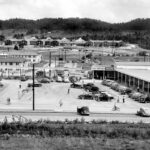
The American Centrifuge Technology Manufacturing Center in south Oak Ridge is pictured above. (Photos courtesy USEC)
USEC, UT-Battelle to preserve centrifuge enrichment capabilities on interim basis
USEC and UT-Battelle have signed a $33.7 million, five-month contract to continue operating centrifuges and conducting research and development activities on a uranium enrichment project deemed important for national security and possible commercial use.
The agreement with UT-Battelle, which manages Oak Ridge National Laboratory, was signed May 1. The five-month term ends Sept. 30. The new agreement includes options for two six-month extensions valued at about $41.7 million each. The total price of the contract with the options is roughly $117 million.
USEC, which is now an ORNL subcontractor, previously performed research, development, and demonstration work on the project, the American Centrifuge Project, under an agreement with the U.S. Department of Energy that had been in place since June 12, 2012. That cost-sharing agreement expired April 30.

In Oak Ridge, USEC workers take part in centrifuge operations, testing, and manufacturing for the American Centrifuge Project.
The scope of the work under the new agreement with ORNL will be about 60 percent of what it was under the earlier agreement with DOE on a dollar-per-month basis, but it wasn’t immediately clear what impact that might have, if any, on jobs at USEC sites in Oak Ridge and Piketon, Ohio. The centrifuges for the project are made in Oak Ridge, where USEC has a manufacturing center, and shipped to the company’s Piketon plant, where they are installed.
“The resulting reduction in scope relates to certain engineering, procurement, and construction activities as well as work related to the manufacturing of new centrifuge machines,” USEC said in a Form 8-K filed with the Securities and Exchange Commission.
In addition, the membership interests of Babcock and Wilcox Technical Services Group Inc. have been transferred, and American Centrifuge Manufacturing LLC is now wholly owned by USEC, which will help in the transition to the new agreement with ORNL, the 8-K said.
USEC has met the project’s technical milestones, but the commercial market for nuclear fuel has been troubled by a drop in demand for enriched uranium after the 2011 meltdown of three reactors in Fukushima, Japan, caused by a tsunami.
In March, USEC Inc., the parent company, announced a Chapter 11 bankruptcy filing and financial restructuring plan.
The DOE takeover was announced by Energy Secretary Ernest Moniz during a House Appropriations subcommittee hearing in April.
“The Energy Department is committed to achieving a reliable domestic source of enriched uranium for national security needs,” DOE said in a statement Monday. “Given that USEC is not currently in a position to commercialize the advanced enrichment centrifuge technology utilized in the American Centrifuge Project, the Energy Department is taking actions needed to maintain the technology and enrichment capability as it explores options for the best way to meet U.S. national security needs.
“As part of this effort, the department has tasked Oak Ridge National Laboratory to assist in developing a path forward that promotes private sector deployment and meets national security needs. These actions will also support the department’s efforts to maintain the advanced centrifuge enrichment machines and its plans to transfer property from USEC to the department in accordance with the terms of applicable leases and agreements, including the steps the department has taken over the past two years to protect taxpayer interests through taking title to the centrifuge machines.”
The Form 8-K said the agreement between UT-Battelle and USEC includes the continued operation of cascades at the Piketon plant, testing at USEC’s facility in Oak Ridge, and core American Centrifuge research and technology activities, with reports furnished to ORNL.
USEC said funding for the earlier agreement with DOE and for the new contract with ORNL—officially known as the American Centrifuge Technology Demonstration and Operations Agreement, or ACTDO Agreement—was included in a federal appropriations bill signed into law in January. The bill appropriated about $62 million for such activities, of which roughly $52.3 million has been provided under the cooperative agreement with DOE, USEC said in the Form 8-K. The spending legislation also gave DOE the authority to transfer up to another $56.7 million of funding within the department’s National Nuclear Security Administration budget to further the research, development, and demonstration of national nuclear security-related enrichment technology.
However, that transfer authority is subject to approval by the House and Senate appropriations committees. But USEC said it understands that the appropriate information has been submitted to Congress.
DOE has asked ORNL to help maintain the centrifuges and enrichment capability, preserve the related intellectual property and workforce expertise, and support the department’s plans to transfer property from USEC to the department. DOE has initially given $9 million to ORNL for the work and submitted its report to Congress, and the department is considering the best way to exercise its transfer authority.
The work for ORNL will be done as DOE explores its options for meeting national security needs. In the meantime, the lab will take action to promote the continued operation of the advanced centrifuges, which USEC could demobilize without more funding, and assess technical options for meeting national security needs and preserving options for commercial deployment.
The agreement between DOE and USEC is intended to protect taxpayers, including through ownership of the centrifuges and other equipment and rights to intellectual property and technical data, in case USEC is unable to commercialize the technology.
See the USEC Form 8-K here:Â 8-K ORNL Agreement FINAL.









Leave a Reply